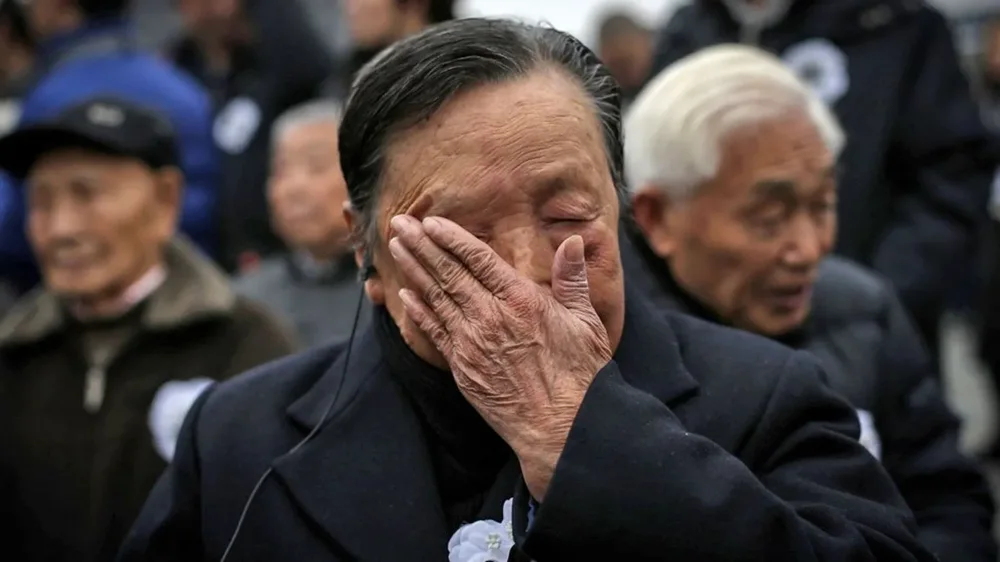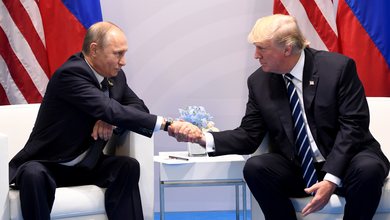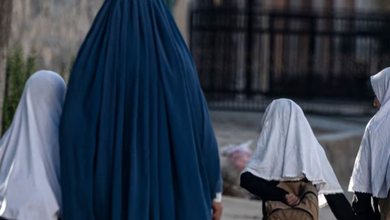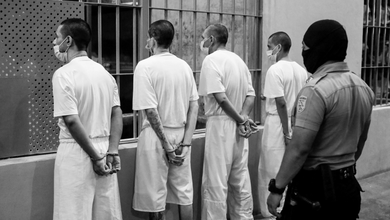
Japanese blogger Hayato Kato, who has 1.9 million followers, is known for his humorous videos about life in China, where he has lived for years.
But on July 26, he surprised followers with a somber video:
"I just saw a movie about the Nanjing Massacre," he said, referring to the brutal six-week assault by the Japanese army on the city of Nanjing in late 1937, in which, by some estimates, over 300,000 Chinese civilians and soldiers were killed. An estimated 20,000 women were raped.
“Dead To Rights,” or “Nanjing Photo Studio,” is a star-studded story about a group of civilians hiding from Japanese troops in a photo studio. It has already become a hit in Chinese cinemas and is just the first in a wave of films depicting the horrors of the Japanese occupation — all released to commemorate the 80th anniversary of the end of World War II.
But a sense of unfinished history – often reinforced by Beijing – continues to fuel memory and anger.
Speaking in Chinese on Douyin (the Chinese version of TikTok), Kato described some of the film's most shocking scenes:
“People lined up along the river and then the shooting started… A baby, the same age as my daughter, was crying in her mother’s arms. A Japanese soldier approached, grabbed her and threw her to the ground.”
He said he had seen many people on the Japanese internet denying the Nanjing Massacre – including public figures and politicians.
"If we deny it, this will happen again," he said, urging the Japanese people to see these films and learn about the dark side of their history.
The video quickly became one of his most viewed – receiving over 670,000 likes in just two weeks.
But the comments weren't all that positive. The most liked comment quoted one of the film's most iconic lines, which a Chinese civilian says to a Japanese soldier:
"We are not friends. We never have been."
For China, the brutal military campaign and Japanese occupation are some of the darkest chapters of the past. The massacre in Nanjing – then the capital – is a deep wound.
What has kept this wound open is the belief that Japan has never fully apologized for its atrocities in the occupied territories – not only in China, but also in Korea, Malaysia (then part of the British Empire), the Philippines and Indonesia.
One of the most painful points concerns the women who were forced to serve as “comfort women” – an estimated 200,000 of them were raped and forced to work in military brothels. To this day, survivors continue to demand forgiveness and compensation.
In his video, Kato admits that this topic is taboo in Japan:
“Unfortunately, these anti-Japanese films are not broadcast publicly in Japan, and Japanese people have no interest in watching them.”
When the Japanese Emperor announced his surrender on August 15, 1945, his country had already suffered a terrible cost – over 100,000 killed in the bombing of Tokyo, before atomic bombs destroyed Hiroshima and Nagasaki.
But the Japanese defeat was welcomed in large parts of Asia, where the Japanese army had inflicted millions of casualties. For these countries, August 15 represents both liberation and unhealed trauma – in South Korea it is called “gwangbokjeol,” meaning “return of light.”
“Even though the military war is over, the historical one continues,” says Stanford University professor Gi-Wook Shin. He explains that the parties remember those years differently, and these differences fuel tensions.
The Chinese see Japanese aggression as a defining and destructive moment in their past, while Japanese history focuses more on Japan's own victimization - such as the atomic bombs and the post-war recovery.
“Most people I know in Japan don’t talk about it,” says a Chinese man who has lived in Japan for 15 years. He asked to remain anonymous.
"They see that period as something of the past and the country doesn't commemorate it – because they also see themselves as victims."
He calls himself a patriot, but says he has had no personal problems over this, because the Japanese themselves avoid sensitive topics.
“Some believe that the Japanese army went to help China create a new order – with conflicts occurring in the process. But there are also those who accept that it was an invasion.”
China fought Japan for 8 years, from Manchuria in the northeast to Chongqing in the southwest. Estimates of Chinese casualties range from 10 to 20 million.
The Japanese government says that about 480,000 of its soldiers were killed at that time.
These years are well documented in Chinese literature and film – including the works of Nobel Prize winner Mo Yan.
Now they are being revisited under a regime that has patriotism at the center of its goals: “national rejuvenation” is how Xi Jinping describes the Chinese dream.
While the Communist Party censors other parts of history – like the Tiananmen Square massacre or the suppression of dissent – it encourages memory of the more distant past, especially one with an external enemy.
Xi even changed the official date of the start of the war with Japan – the Chinese government now counts it from the first invasion of Manchuria in 1931, making it a 14-year war, not just 8.
Under his leadership, Beijing is commemorating the end of World War II with ever-increasing ceremonies. On September 3, the day Japan signed its formal surrender, a grand military parade will be held in Tiananmen Square.
Also in September, a highly anticipated film about the infamous Unit 731 – a branch of the Japanese military that conducted horrific experiments on humans in occupied Manchuria – will be released in theaters.
Data e publikimit – 18 shtator – përkon me ditën e pushtimit të parë të Japonisë në Mançuri.
Gjithashtu janë paralajmëruar filmat:
Dongji Rescue, i frymëzuar nga historia e vërtetë e peshkatarëve kinezë që shpëtuan qindra robër britanikë, dhe
Mountains and Rivers Bearing Witness, një dokumentar nga një studio shtetërore për rezistencën kineze.
Këto filma duket se po godasin një nerv të thellë emocional:
“Ajo gjeneratë bëri luftë për tre breza, dhe duroi vuajtje për tre breza. Nder për dëshmorët”, shkruan një postim i njohur në RedNote për filmin Nanjing Photo Studio.
“Ne nuk jemi miq…” – kjo fjali tashmë e famshme – “nuk është vetëm një frazë mes dy personazheve”, thotë një koment në Weibo me mbi 10,000 pëlqime.
“Është edhe nga miliona kinezë të zakonshëm për Japoninë. Ata nuk kanë kërkuar kurrë ndjesë të sinqertë, ende adhurojnë kriminelët e luftës, po risin historinë – askush nuk i sheh si miq.”
Tokio ka kërkuar falje, por shumë kinezë besojnë se nuk kanë qenë të mjaftueshme.
“Japonia vazhdon të dërgojë mesazhe kontradiktore,” thotë prof. Shin, duke iu referuar rasteve kur liderët japonezë kanë kundërshtuar njëri-tjetrin për deklaratat mbi të kaluarën e luftës.
Për vite, në klasat e historisë kineze, nxënësit kanë parë një foto të ish-kancelarit të Gjermanisë Perëndimore, Willy Brandt, i cili në vitin 1970 gjunjëzohet përpara një memoriali për Kryengritjen e Getos së Varshavës.
Kinezët presin një gjest të ngjashëm nga Japonia.
Por kjo nuk ka qenë gjithmonë kështu.
Kur Japonia u dorëzua në 1945, trazirat në Kinë nuk përfunduan.
Tre vitet në vijim, nacionalistët e Kuomintang-ut – atëherë qeveria zyrtare dhe forca kryesore e rezistencës – u përplasën në një luftë civile me komunistët e Mao Zedong-ut.
Kjo luftë përfundoi me fitoren e Mao-s dhe tërheqjen e Kuomintang-ut në Tajvan.
Mao, që kishte për prioritet ndërtimin e një shteti komunist, nuk u përqendrua në krimet e luftës japoneze.
Përkujtimet nderonin fitoren e Partisë Komuniste dhe kritikonin Kuomintang-un. Ai kishte gjithashtu nevojë për mbështetjen e Japonisë në arenën ndërkombëtare.
Në fakt, Tokio ishte një nga fuqitë e para të mëdha që e njohu regjimin e tij.
Vetëm pas viteve 1980 – pas vdekjes së Mao-s – pushtimi japonez filloi të rikthehej si çështje në marrëdhëniet Pekin-Tokio.
Në atë kohë, Japonia ishte tashmë një aleat i pasur i Perëndimit me një ekonomi në lulëzim. Ndryshimet në librat japonezë të historisë shkaktuan polemika, me Kinën dhe Korenë që akuzonin Japoninë se po zbardhte krimet e luftës.
Kina sapo kishte nisur hapjen, dhe Koreja ishte në tranzicion drejt demokracisë.
Ndërsa udhëheqësit kinezë u larguan nga trashëgimia e Mao-s, traumat e luftës u kthyen në një narrativë bashkuese për Partinë Komuniste, thotë Yinan He, profesoreshë në universitetin Lehigh në SHBA.
“Pas Revolucionit Kulturor, shumë njerëz në Kinë ishin të zhgënjyer nga komunizmi”, tha ajo për BBC.
"When communism lost influence, you needed nationalism. And Japan was an easy target – because it was the last external aggressor."
She describes this as a “curated representation of the past,” where commemorations of 1945 often downplay the role of the US and the Kuomintang, and coincide with a growing analysis of Japan’s stance on its history.






















